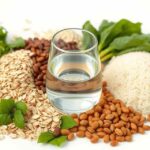Fertility Diet Meal Plan: The Right Foods To Naturally
Your path to parenthood begins with what’s on your plate. Research shows that nourishing your body with balanced, whole-food choices can create a supportive environment for conception. The American Society for Reproductive Medicine emphasizes the importance of micronutrients and macronutrient harmony in reproductive wellness.

Millions of couples face challenges when trying to conceive, but small changes in daily eating habits can make a meaningful difference. By focusing on fresh, nutrient-rich ingredients, you’re not just feeding your body—you’re fueling hope. This approach combines scientific insights with kitchen-tested strategies, helping you build meals that align with your goals.
Think of this as more than a temporary fix. It’s a lifestyle shift that celebrates vibrant, satisfying dishes while prioritizing reproductive health. You’ll learn how certain ingredients work together to balance hormones and support cellular function. Best of all, these adjustments fit seamlessly into modern routines, proving that eating well doesn’t require complexity.
Key Takeaways
- Whole-food nutrition supports reproductive wellness through balanced nutrients
- Strategic meal combinations can influence hormonal balance and cellular health
- Dietary adjustments may complement other conception-support strategies
- Simple ingredient swaps create satisfying, purpose-driven meals
- This approach focuses on abundance rather than restriction
- Practical planning makes nutritious eating achievable for busy lifestyles
- What Foods Improve Male Fertility: Fertility-Boosting Foods
Understanding the Role of Diet in Fertility
The foundation of reproductive wellness often starts in the kitchen. What we eat directly impacts cellular processes that influence conception. Research reveals that strategic nutritional choices can create an optimal environment for biological functions critical to creating life.
What Is Conception Capacity?
Your body’s ability to conceive involves complex interactions between hormones, blood sugar levels, and cellular health. Studies show that 30% of conception challenges relate to metabolic factors. Consuming antioxidant-rich ingredients helps combat oxidative stress, a hidden barrier many discover only when trying to conceive.
Vitamins like folate and minerals such as zinc act as co-factors in DNA synthesis and hormonal regulation. These nutrients support egg maturation and sperm motility, proving that nourishment goes beyond basic needs.
Power of Unprocessed Ingredients
Whole ingredients deliver compounds that processed versions lack. Leafy greens provide iron for oxygen transport, while fatty acids in nuts support hormone production. This approach helps stabilize insulin response—a key factor in 70% of ovulation-related cases.
Choosing colorful produce and lean proteins creates meals that satisfy hunger while addressing root causes of inflammation. Each bite becomes a conscious step toward supporting your goals, blending science with practical kitchen wisdom.
Key Fertility-Boosting Foods to Include
Building a foundation for conception starts with selecting nutritional allies that work synergistically with your body. Certain ingredients contain compounds shown to enhance cellular health and hormonal balance – critical factors in reproductive success.

Leafy Greens, Whole Grains, and Healthy Fats
Dark leafy vegetables like spinach and kale deliver iron and folate, supporting oxygen transport and DNA synthesis. Whole grains such as quinoa help regulate insulin levels, while oats provide fiber for digestive wellness.
Avocados and walnuts supply monounsaturated fats that reduce inflammation. These fats act as building blocks for hormone production. Olive oil’s polyphenols protect cells from oxidative damage, creating a favorable environment for biological processes.
Proteins, Full-Fat Dairy, and Essential Micronutrients
Plant-based proteins like lentils offer Zinc for egg maturation. Wild salmon provides omega-3 fatty acids that improve blood flow to reproductive organs. Eggs contain choline, shown to support fetal development in early stages.
Full-fat yogurt supplies conjugated linoleic acid linked to improved ovulation patterns. Berries pack antioxidants that combat free radicals, while citrus fruits deliver vitamin C for collagen formation. Bananas’ potassium helps maintain fluid balance, aiding hormone regulation.
Meal Planning for Fertility: Tips and Tricks
Organizing your kitchen routine can become your secret weapon for supporting reproductive wellness. Smart preparation transforms hectic weeknights into opportunities for nourishing choices that align with your goals. With clever strategies, you’ll spend less time scrambling and more time enjoying meals that work double-time for your body.
Easy Meal Prep Ideas for Busy Schedules
Start with overnight oats layered with chia seeds and almond butter. These jars stay fresh for five days, offering fiber and plant-based protein. Top with antioxidant-rich blueberries or raspberries for extra nutritional punch.

Batch-cook quinoa or farro on Sundays to create versatile bases. Toss these grains with roasted veggies or leafy greens for instant lunches. Pre-portion walnuts and pumpkin seeds in snack bags for quick energy boosts.
Recipes for Nutritious Breakfasts, Lunches, and Dinners
Whip up egg muffins loaded with spinach and bell peppers for grab-and-go mornings. Blend frozen mango, kale, and Greek yogurt for creamy smoothies that deliver vitamins C and K. These options keep blood sugar steady while providing essential nutrients.
Assemble mason jar salads with lentils, shredded carrots, and olive oil dressing. For dinners, pair pre-grilled chicken with roasted sweet potatoes and broccoli. This approach ensures every bite supports cellular health without demanding hours in the kitchen.
Addressing Fertility Challenges with Diet Adjustments
Taking charge of reproductive wellness involves more than adding nutrient-rich ingredients—it requires eliminating obstacles. Modern eating patterns often introduce hidden barriers through convenience products. Identifying these saboteurs creates space for biological systems to function optimally.
Ingredients That Work Against Your Goals
Refined carbs like pastries spike blood sugar, disrupting insulin sensitivity. Fried snacks containing trans fats trigger inflammation, while artificial sweeteners confuse hormone signals. BPA-lined containers may leach chemicals that mimic estrogen, creating imbalance.
Swap sugary drinks for herbal teas rich in antioxidants. Choose glass storage over plastic to avoid endocrine disruptors. These changes support cellular repair while reducing oxidative stress.
Creating Harmony Through Daily Habits
Maintaining a healthy weight improves ovulation regularity and egg quality(how to increase egg quality). Prioritize sleep to regulate cortisol levels—chronic stress alters reproductive hormones. Gentle movement like walking enhances circulation to reproductive organs.
Small shifts compound over time. Steaming vegetables instead of frying preserves nutrients. Roasting nuts at home avoids industrial seed oils. Each choice builds momentum toward your vision of wellness.
Final Thoughts: Fertility Diet Meal Plan
Implementing a fertility diet meal plan can significantly enhance reproductive health. Prioritizing whole foods rich in essential nutrients helps to create a balanced hormonal environment, crucial for conception. Incorporating a variety of fruits, vegetables, whole grains, and healthy fats not only supports ovulation but also improves overall well-being. Meal prepping can streamline the process, making it easier to stick to healthy choices even on busy days. Remember, small, consistent changes in your diet can lead to lasting benefits. Ultimately, nurturing your body with the right foods lays a strong foundation for fertility and a healthy pregnancy.
FAQ For Fertility Diet Meal Plan
Q1. How does nutrition impact reproductive health?
Ans: Eating nutrient-rich foods like whole grains, leafy greens, and avocados provides antioxidants, fiber, and healthy fats. These help regulate hormones, reduce inflammation, and create an optimal environment for conception by stabilizing blood sugar and supporting egg quality.
Q2. What are the best foods to support hormone balance?
Ans: Focus on options like spinach, lentils, and walnuts—packed with folate, iron, and omega-3s. Full-fat yogurt and pasture-raised eggs also promote hormone harmony. Avoid trans fats and refined sugars, which can disrupt insulin sensitivity and ovulation.
Q3. Can meal prep simplify a busy lifestyle while prioritizing wellness?
Ans: Absolutely! Batch-cook quinoa, roast veggies, or blend smoothie packs for grab-and-go meals. Try overnight oats with chia seeds or lentil salads with olive oil. Simple swaps, like swapping white rice for farro, add nutrients without extra effort.
Q4. Are there specific ingredients to avoid when trying to conceive?
Ans: Limit processed snacks, sugary drinks, and fried foods high in trans fats. These spike blood sugar and increase inflammation. Opt for whole-food alternatives like berries, almonds, or hummus with crunchy veggies for sustained energy.
Q5. How can lifestyle changes complement dietary choices?
Ans: Pair nourishing meals with stress-reducing practices like yoga, walks in nature, or mindfulness. Prioritize sleep and stay hydrated with herbal teas or infused water. Small, consistent shifts build a foundation for overall vitality.
Q6. What breakfast ideas kickstart the day with fertility-friendly nutrients?
Ans: Blend a smoothie with spinach, almond butter, and frozen mango. Or try avocado toast on sprouted grain bread topped with a pasture-raised egg. These meals balance protein, fiber, and healthy fats to fuel your body mindfully.












